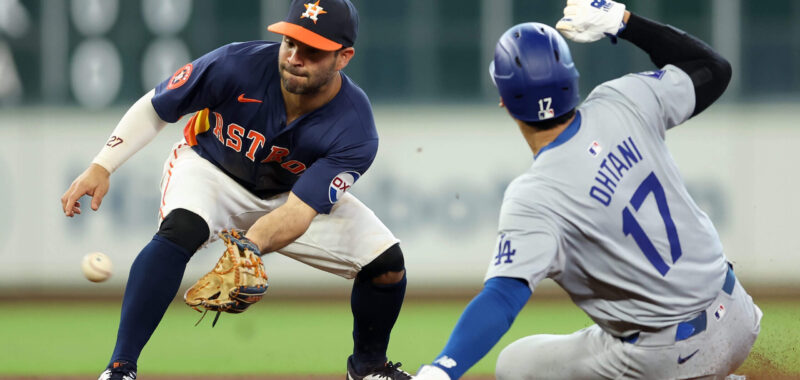HOUSTON — Into an inferno stepped Bryan King, a mustachioed man with 36 days of major-league service time. Few in this sellout crowd could pick him out of a lineup, but they came to a crescendo each time this rookie southpaw came set in the seventh inning of a one-run game.
Baseball’s most dangerous man stood 60 feet and 6 inches away, threatening to turn a tense game into anything but. Not once in his first month as a major leaguer had King pitched on consecutive days. He threw 19 pitches and procured two outs during Saturday’s improbable comeback. A day later, he delivered the game’s biggest strikeout and stole momentum with three four-seam fastballs.
Shohei Ohtani swung at none of them: not the first one on the inner half, the second at his letters or the 93.8 mph offering that nicked the outside corner of Brennan Miller’s strike zone.
The umpire rang up Ohtani and offered the Houston Astros a chance to capture a sweep. That they couldn’t is the consequence of a circumstance only Tuesday evening’s trade deadline can correct.
King is the only left-handed reliever Houston will deploy before the ninth inning. He entered Sunday’s game with one objective: stymying the sport’s best left-handed hitter and stranding a base runner. King accomplished it. Asking for anything more felt aggressive. Roster construction made it mandatory.
King surrendered two runs in the eighth inning, but focusing on that outcome obscures the overarching point. Nothing that happened during Sunday’s 6-2 loss to the Los Angeles Dodgers should inspire more urgency or invite more concerns. General manager Dana Brown arrived at the ballpark in need of more pitching. He exited in the same predicament.
Brown spent most of the day making the media rounds, first giving his regularly scheduled interview on the team’s pregame radio show before appearing on the Space City Home Network broadcast booth during the second inning. Nothing Brown said suggested an imminent deal.
“It’s always two steps forward, one step back until you get late into the process,” Brown told the pregame show. “You get close on some deals, you start talking about the prospects and then the prospect climb gets a little too heavy and that makes it difficult.”
Houston is operating at a disadvantage in a sellers’ market. Too many contenders to count are in search of starting pitching. Most of them can offer better prospect packages than the Astros, who maintain interest in Jack Flaherty, Yusei Kikuchi and Jameson Taillon, among others. Brown acknowledged on Sunday that Houston has started discussions with other buyers “in order to open up the market.”
“Maybe they have a surplus, maybe we have a surplus, maybe there’s something we can do to swap players out and both teams will still be pretty good,” Brown said.
A lack of upper-level depth in the minors makes it almost impossible for the Astros to trade from their big-league roster, but if there is a surplus, it is in the outfield. Joey Loperfido, Trey Cabbage and Chas McCormick are jockeying for playing time at the major-league level. Top prospect Jacob Melton’s recent promotion to Triple A may squeeze time there from Pedro León, who has always profiled as an obvious trade candidate.
Houston already is at a pitching deficiency, so trading from the big-league staff feels far-fetched unless a club is willing to take on reliever Rafael Montero’s three-year, $34.5 million contract. Montero walked two more batters on Sunday and surrendered a run, inflating his ERA to 4.70 after 38 1/3 innings.
Montero is nothing more than a mop-up reliever for a bullpen in need of more options. His misery is, in part, why first-year manager Joe Espada sent King back out for the eighth inning on Sunday. Ryan Pressly, Bryan Abreu and Josh Hader have each made at least 42 appearances in Houston’s first 105 games. Espada bucked convention during Saturday’s rally, deploying Abreu in a game Houston trailed for the first time since May 22.
It paid off, but it can’t become common practice. Preserving Pressly, Abreu and Hader is of foremost importance. None of those three leverage relievers were pitching on Sunday unless Houston had a lead or, in Pressly’s case, tied the game in the eighth inning. Tayler Scott had thrown on back-to-back days, too, so Espada sent King to face right-handed hitting Teoscar Hernández in the eighth inning. He deposited King’s first pitch into the Crawford Boxes.
Teoscar sends one to the Crawford Boxes 💪 pic.twitter.com/WryccPDPFK
— MLB (@MLB) July 28, 2024
The Astros are exploring the reliever market, Brown said, though prices there are higher than for starters. Even if Houston does only acquire a starter, the expected returns of Justin Verlander and Luis Garcia could ostensibly push an existing starter into the bullpen, thereby strengthening the corps from within. Injuries have ravaged its rotation, but Houston has remained remarkably healthy in the bullpen.
Sustaining it is another matter entirely, but that could be said for Houston’s entire team. Only three major-league lineups have hit fewer home runs than the Astros since June 4, the first day of outfielder Kyle Tucker’s 44-game absence.
Passing the baton has been prioritized in place of power, a fact Saturday’s comeback win proved. The team totaled two extra-base hits and still erased a five-run deficit, a testament to the hitters’ approaches and buy-in along with a legitimate concern of whether it can be maintained against the caliber of pitching Houston hopes to face in the playoffs.
“We’re very fortunate that we’re playing as well as we are without (Tucker),” Brown said, “but it’s not sustainable.”
Sunday offered another glimpse why.
(Photo of Jose Altuve and Shohei Ohtani: Tim Warner / Getty Images)

